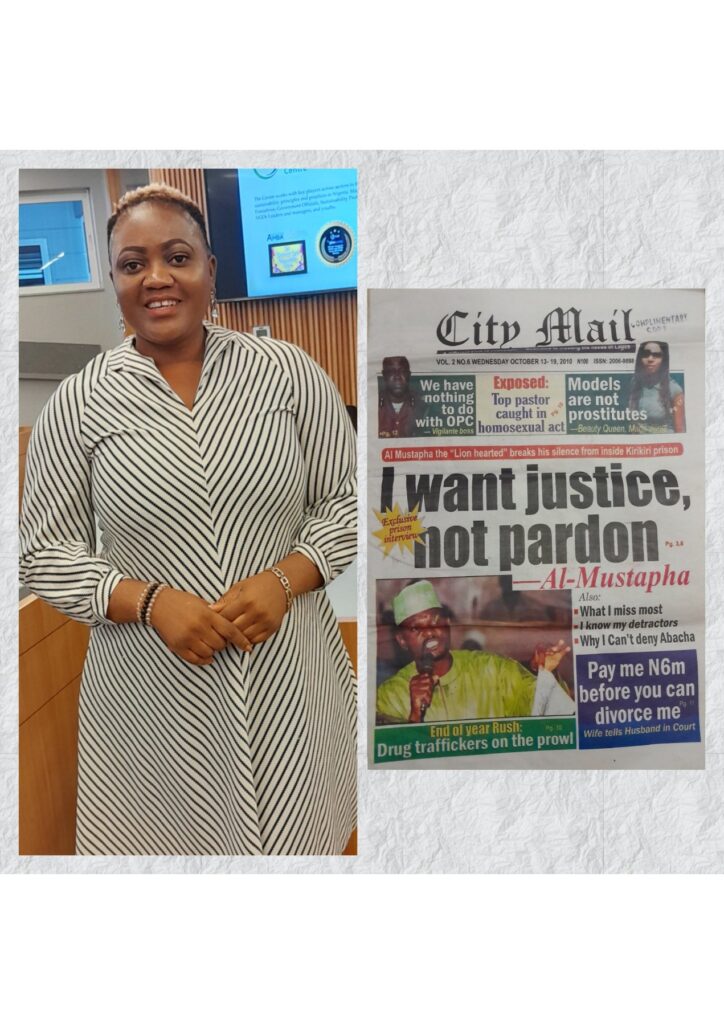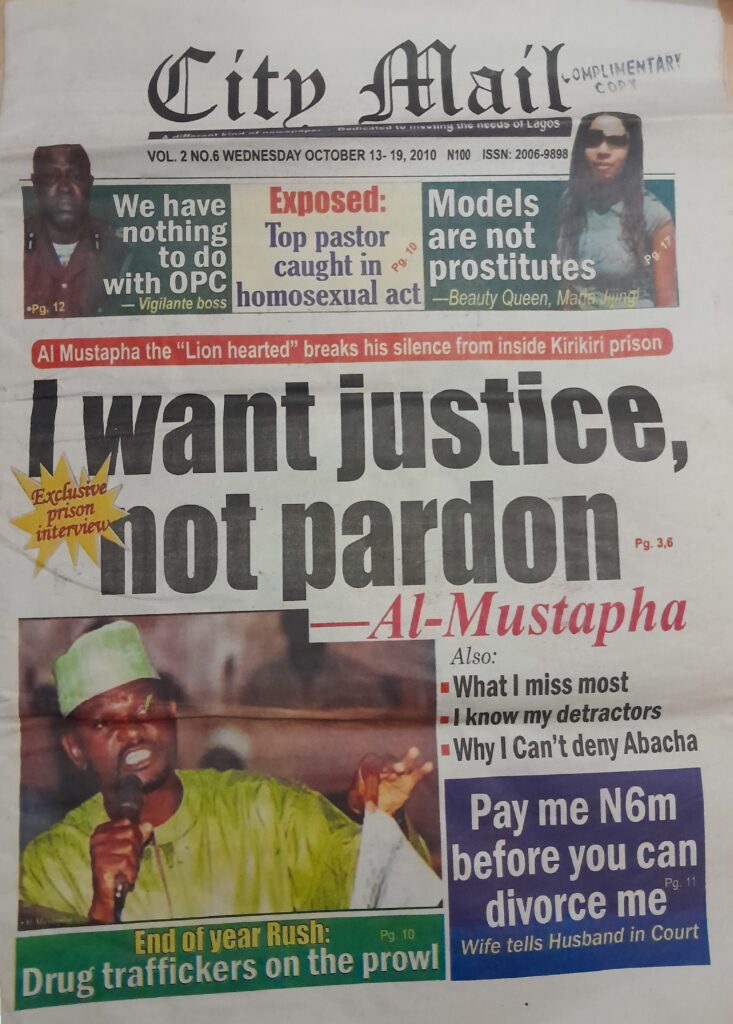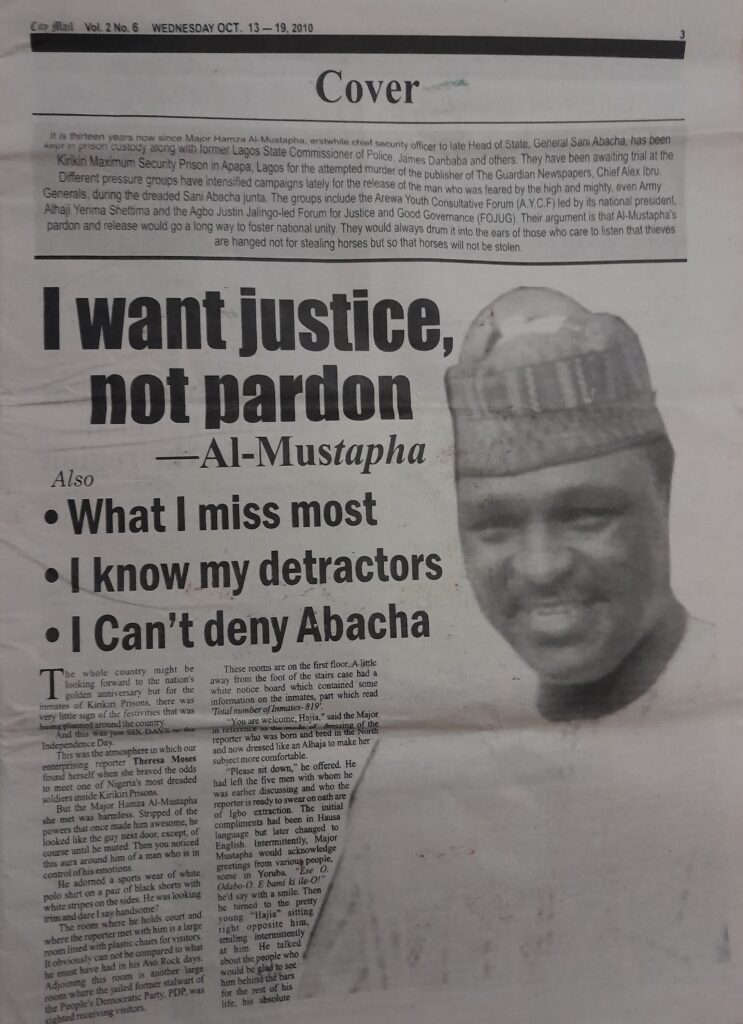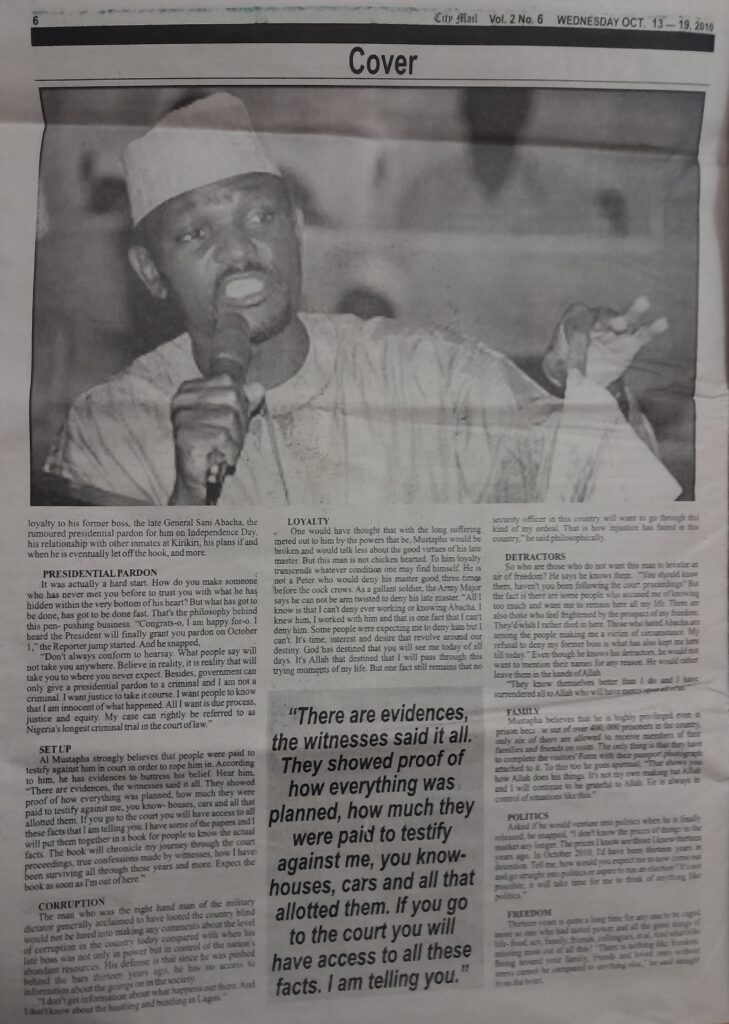By Theresa Moses

Thirteen years ago, as an ‘enterprising reporter,’ I braved the odds to meet one of Nigeria’s most controversial soldiers (at the time), Major Hamza Al-Mustapha (retd). He served as the Chief Security Officer (CSO) to Gen Sani Abacha, Head of State and Commander-in-Chief of the Armed Forces, from 1993 until his death on June 8, 1998. Hamza was accused (rightly or wrongly) for several arbitrary detentions of military officers and civilians.
A thoroughbred intelligence officer, he later joined the bulging ranks of Nigerian politicians. Interviewing Al-Mustapha while he was still being detained in Kirikiri Maximum Prison, Lagos, was intriguing and, undoubtedly, the most extraordinary journalistic experience I have ever had. It was a transformative encounter that had a profound impact on my career as an investigative journalist. At the time, it was an unparalleled opportunity, but it also came with challenges and risks that eventually helped in reshaping my career trajectory.
As a young lady trying to make a mark in the male-dominated field of journalism, overcoming stereotypic biases would have been a major challenge, but my passion and zeal were the driving forces that facilitated my determination to deliver an exclusive front-page story. The underpinning being that delivering on that top-notch assignment fuelled my continued success thereafter, a testimonial to my dedication and talent.

It also equipped me with the ability to overcome challenges while experiencing personal and professional growth in the profession, enablers that oiled my consciousness to succeed despite the odds.
First and foremost, the interview marked a turning point in my career as it allowed me to delve into a deeply secretive and authoritarian regime, throwing light on the inner workings of power. It required meticulous planning, courage, and tenacity to gain access to the maximum security prison and secure an interview without exposing my sources.



he experience also helped to hone my skills as an investigative journalist, teaching me the importance of meticulous research, fact-checking, and safeguarding sources. It made me more adept at navigating complex and high-stake situations, which served me well in my subsequent reporting endeavours.
Major Hamza Al-Mustapha, almost power-drunk and so revered, was ultimately stripped of the power that emboldened and gave him a larger-than-life image. Though he looked like a conformist, he was unwavering and undaunted, even as he remained bold and outspoken, despite his condition in the gulag.
Meeting him for the first time, he was awesome; he looked like the guy next door, except, of course, until he muted. A man with so many auras around him and in control of his emotions while in prison, he exclusively spoke about what he missed most: his detractors and loyalty to his former boss, the late Gen Sani Abacha.

Al-Mustapha’s trial lasted 15 years, calling it a man’s inhumanity to man, but he was sure that he would get justice and come out alive because he believed that his trial was a set-up and persecution from certain quarters by those not in support of the roles he played while he held sway as CSO to the late dreaded dictator.
With the long suffering he passed through, one had expected he would be broken and talk less about the good virtues of his late principal. But no, to Al-Mustapha, loyalty transcends whatever condition one may find himself in.
It’s worth noting that the exclusive interview or chat with Al-Mustapha wouldn’t have been possible without my knowledge and understanding of Hausa Language. Overcoming the challenge of conducting the interview in Hausa to be translated into English for publication was quite an accomplishment, indeed a showcasing of my impressive skills and dedication. Such a feat not only enabled a wider audience to access the interview but also demonstrates the reporter’s ability to bridge language barriers with a view to conveying important information. It’s a testament to the journalist’s professionalism, despite the challenges of communication in a multilingual society.

Over the years, I continued to build on the expertise gained during that pivotal interview. In essence, interviewing Abacha’s CSO in prison was a career-defining moment that not only expanded my horizon but also solidified my reputation as an investigative journalist, willing to tackle challenging stories head-on.
Besides, it propelled me onto a path of impactful reporting aimed at uncovering the truth and holding those in power accountable for their actions.
Revisiting this interview offered me a reflection on how the country has evolved since that time. Well, it’s said, “Old habits never die.” Thirteen years later, I found it necessary to express my heartfelt appreciation to the key individuals who played pivotal roles in making that investigative journey possible.
First and foremost, I extend my gratitude to Mr. Muyiwa Adetiba, publisher of the defunct City Mail Newspaper, who supported and believed in the importance of this story. His commitment to the principles of fearless journalism and dedication to uncovering the truth allowed this interview to see the light of day. Without his backing, this monumental reporting endeavour would not have been possible.
To the diligent and insightful editor, Mr. Sunny Okim, the Grandmaster, who worked tirelessly to shape the narrative, fact-check the details, and maintain a high journalistic standard, I offer my sincere thanks. His guidance and expertise were instrumental in ensuring the accuracy and integrity of the story. His commitment to upholding the ethics of journalism made a significant difference.
Equally important, I express my deepest appreciation to my sources, who risked their safety and security to provide crucial information and access to Al-Mustapha while in prison. Their trust and willingness to share their knowledge were invaluable in shedding light on a period of Nigeria’s history of military regimes shrouded in secrecy. Their courage in speaking out was not only a testament to their commitment to truth and transparency, but also an act of immense bravery.
Thirteen years after the groundbreaking interview with Major Hamza Al-Mustapha, I now reflect on the ominous power of intimidation, or, rather, leave it at funding challenges, which resulted in City Mail Newspaper going out of print shortly after the interview. This highlights a broader issue of media censorship and the suppression of information, preventing the public from gaining a full understanding of the truths exposed on power play during that pivotal moment of Nigeria’s political history. The stifling of journalistic freedom and the unavailability of vital information hinder transparency and accountability, which is the bane of our society.
It’s with deep gratitude that I reflect on this experience, knowing that the impact of the report will continue to resonate in the years to come.
Share your story or I Witness Reports with us 24/7 via: SMS/ Whatsapp: +234(0)8072022024, Email: [email protected], follow us on our social media platform: Twitter, Instagram, Facebook:@Gatmash and Subscribe to our YouTube Channel: Gatmash TV.
Gatmash News is one of the most sought- afterb news portals, with increasing audience, exclusive breaking newsg and reports across the globe. Plus more. Website: https://gatmash.com
For advert placement, contact us today via email: [email protected] or call our hotlines on Tel: +234(0)8072022024





